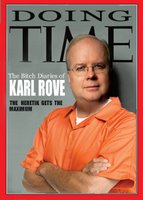It's beginning to look alot like FITMAZ...
 Looks like Karl Rove is getting handcuffs for X-mas
Looks like Karl Rove is getting handcuffs for X-masFrom CounterPunch
Special Prosecutor Patrick Fitzgerald met with the grand jury investigating the leak of covert CIA agent Valerie Plame Wilson for several hours Friday. Short of a last minute intervention by Rove's attorney, Fitzgerald is expected to ask a grand jury-possibly as soon as next week--the to indict Rove for making false statements to the FBI and Justice Department investigators in October 2003, lawyers close to the case say.It's a wrap for Rove as he's been caught red-handed by Fitzgerald. Now the CIA leak inches closer to the President's feet because Novak says that the Bush knows who leaked the name and we still don't know who the person who leaked the name is. It's foolish to belive that someone with the inside knowledge like Novak would say something like this if he wasn't sure about it (he's in enough hot water over the whole case as it is).
Moreover, Fitzgerald is said to believe that there is a possibility Rove either hid or destroyed evidence related to his role in the leak, lawyers close to the case said.
A few weeks after he took over the investigation into the leak of covert CIA agent Valerie Plame Wilson in early 2004, Fitzgerald had already become suspicious that Karl Rove and Vice President Cheney's then-chief of staff I. Lewis "Scooter" Libby were hindering his investigation.
In late January 2004, Fitzgerald sent a letter to his boss, then acting Attorney General James Comey, seeking confirmation that he had the authority to investigate and prosecute individuals for additional crimes, including obstruction of justice, perjury, and destroying evidence. The leak investigation had been centered up to that point on an obscure law making it a felony for any government official to knowingly disclose the identity of an undercover CIA officer.
Comey responded to Fitzgerald in writing Feb. 6, 2004, confirming that Fitzgerald had the authority to prosecute those crimes, including "perjury, obstruction of justice, destruction of evidence, and intimidation of witnesses."
Fitzgerald was concerned that Rove had hidden or destroyed a very important document tying him to the leak. His suspicions may have been right: an email he sent to then Deputy National Security Adviser Stephen Hadley in early July 2003 later proved Rove had spoken to Time magazine reporter Matthew Cooper about Plame-a fact that Rove omitted when he was first interviewed by the FBI.
The same day Fitzgerald received the response letter from Comey the White House faced a deadline of turning over administration contacts with 25 journalists to the grand jury investigating the leak. One of the journalists cited in the subpoena sent to the White House Jan. 22, 2004 was Cooper. Three months earlier, in late 2003, then-White House counsel Alberto Gonzales enjoined all White House staff to turn over any communication about Valerie Plame Wilson and her husband. Gonzales' request came 12 hours after senior White House officials had been told of the pending investigation. The email Rove sent to Hadley which specifically cited "Matt Cooper from Time" never turned up in that request either, people close to the investigation said.
[...]
Over the past few weeks, the time frame when Fitzgerald became increasingly suspicious-specifically February 2004-has become crucial for Rove. He testified before Fitzgerald's grand jury that month without revealing he had been a source for Cooper and Novak, saying only that he had shared information about Plame Wilson with other journalists-including Chris Matthews, the host of MSNBC's Hardball-after her name had appeared in Novak's column.
In a bid to keep Rove out of Fitzgerald's crosshairs, Robert Luskin, Rove's attorney, recently told Fitzgerald that he had a conversation with Time Magazine reporter Viveca Novak in February 2004 where she inadvertently revealed that Rove had been a source for her colleague Matt Cooper. Luskin said this prompted an exhaustive search for the Hadley email which was promptly turned over to Fitzgerald and led Rove to change his testimony.
Luskin testified Dec. 2 that the Novak meeting took place in late January or early February 2004, the very month in which Fitzgerald had sought the authority to prosecute officials if they were found to have hindered his investigation into the leak.
Novak, however, testified that she met Luskin in either March or May 2004, those close to the case said. This discrepancy is at the crux of what Fitzgerald is investigating. Rove didn't reveal to the grand jury that he had spoken with Cooper until Oct. 15, 2004.
Oh, 2006 is looking so good.















<< Home